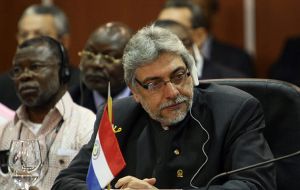MercoPress. South Atlantic News Agency
Brazilian official regrets Paraguay did not follow the path of Venezuela, Ecuador and Bolivia
 International affairs advisor Marco Aurelio argues “Mercosur is equal to minus Paraguay plus positive Venezuela”
International affairs advisor Marco Aurelio argues “Mercosur is equal to minus Paraguay plus positive Venezuela”  Lugo was unable to build a majority coalition or convene social mobilization in support of institutional change
Lugo was unable to build a majority coalition or convene social mobilization in support of institutional change Brazilian international affairs advisor Marco Aurelio Garcia admits the incorporation of Venezuela to Mercosur was done without Paraguay’s approval and argues the downfall of Fernando Lugo was because of his political incapacity to follow on the steps of other countries with strong popular support such as Venezuela, Bolivia and Ecuador
In an article written for the latest edition of Brazil’s Foreign Policy magazine, Marco Aurelio argues that “Mercosur is equal to minus Paraguay plus positive Venezuela” and analyzes recent Paraguayan politics basically affirming that former president Lugo ‘won the elections but never had control of power’.
“Power is not a place that can simply be taken over as the Latinamerican left believed for some time. Power is the expression of a co-relation of forces that encloses economic, social, political and cultural factors and to alter this co-relation is not enough to reach government, and least to a part of it as happened in Paraguay. You need ideas and instruments to mobilize people capable of building a change and a transforming project”, argues the advisor to President Dilma Rousseff and her political mentor and former president Lula da Silva.
Marco Aurelio points out that the avalanche of social and political changes which South America has undergone in the last fifteen years opened three possible paths to ensure governance to the presidents involved, and then questioning the removed Paraguayan president (and former bishop). He underlines that Lugo was unable to build ‘a new order’ similar to that which was successful in other countries such as Venezuela, Bolivia and Ecuador by their presidents.
“In a country where there was an automatic correspondence between the vote for the Executive and the Legislative, the president had to ensure a congressional majority based on program accords and the conformation of a ministerial cabinet that reflected a hegemonic coalition”, points out Marco Aurelio.
He adds that in those countries where the access of new social actors to the political scene came across obsolete institutions, deep political transformations took place, capable of making viable the promises of economic and social reforms that took the new rulers to office.
In the Paraguayan case, there was the need for an institutional re-foundation which adjusted to the new correlation of forces born out of the ballot. In most cases, this re-foundation anxiety set an agenda of Constitutional Assemblies capable of designing a new institutional order, such was the path followed during the last decade by Venezuela, Ecuador and Bolivia. The constitutional assemblies made possible in the three countries a new constitutional order, legitimized by popular referendums which bestowed to their presidents the governance that their predecessors in office lacked. Lugo was unable to implement any of these alternatives”, affirms Marco Aurelio.
The administration of Lugo was unable to build a congressional basis that made effective such a support and did not convene social groups to press in favour of those institutional changes which would open the way for the changes demanded by their voters, emphasises the Brazilian official.
“Because of this lack of decision as to the path to follow, on the one side the social groups de-mobilized and on the other a growing militancy from traditional political parties and groups against the president included the Liberal Party, which was the main ally in the winning electoral coalition”.
As to the removal of Lugo in June 2012, Marco Aurelio mentions another element and circumstance of great significance and impact: the massacre of Curuguaty when 17 police members and landless peasants were killed after a shootout.
“This regrettable and still obscure incident was one of many conflicts in the Paraguayan countryside which the government of Lugo was suffering since it took office”.
Another factor mentioned by the international affairs expert is the Mercosur democratic protocol, better known as Ushuaia II.
“It was not unnoticed the legislative hostility from the opposition towards the Ushuaia II protocol. Paraguayan Senators said the protocol attacked the country’s sovereignty and made its approval by Fernando Lugo (ad referendum from the Senate) one of the main arguments of the constitutional case for his removal from office”.
Finally as to the suspension of Paraguay from Mercosur and Venezuela’s admission to the group as full member, Marco Aurelio admits it was done without the approval of the Paraguayan Senate.
“At the summit in Mendoza, Argentina, Brazil and Uruguay also decided by consensus to resolve a question that was pending for years: the formalization of Venezuela’s incorporation to the block approved by the legislatives of all Mercosur member countries with the exception of Paraguay”, concluded Marco Aurelio.




Top Comments
Disclaimer & comment rules-

-

-

Read all commentsOH dear, ANOTHER Brazilian idiot.
Jul 15th, 2013 - 11:10 pm 0You can see why Dilma might not get re-elected if these are the best people she can select from.
I wouldn't trust this idiot to feed my dog.
Nothing at say .Can it really be true that this man is Rousseffs main foreign policy advisor ! Where , oh where , are the professional diplomats ? I used to remember the good old days when Brazilian diplomats were respected . I also think that this was the man who advised Lula da Silva to get involved in Iran nuclear negotiations . Which were a complete disaster .
Jul 15th, 2013 - 11:56 pm 0The problem with power when you see yourself as an ideological leader is that, like that or not, you got to have to deal with ppl with different ways of thinking, idelogies and pov´s. Including ppl inside your goverment when all think alike is not only a good manner of keeping yourself blind of your goverent flaws but it also creates resentment from other sectors of society as well as most of the ppl. At the end those goverments don´t last much unless they learn to cooperate and manage different pov. The problem isn´t that Paraguay doesn´t have a left leaning goverment, but that both Lugo and Left leaning leaders in Mercosur don´t know how to balance goverment institutions without imposing themselves on them.
Jul 16th, 2013 - 12:54 am 0Commenting for this story is now closed.
If you have a Facebook account, become a fan and comment on our Facebook Page!